From Tabasco sauce to Taiwanese Tex-Mex: Felicity Cloake's American odyssey
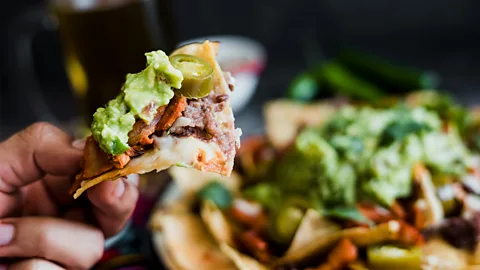 Getty Images
Getty ImagesFor her new book, Peach Street to Lobster Lane, British food writer Felicity Cloake cycles across the US from coast to coast in search of a definition for its national cuisine.
Gordon Ramsay famously credits his success in the US to Americans knowing nothing about good food. Felicity Cloake begs to differ.
In her new book, Peach Street to Lobster Lane, the award-winning British food writer sets out to challenge the stereotype of American food as deep-fried and cultureless. "On this trip, I'm determined to find this unicorn, cover it with ketchup and pickles and have it for lunch," she writes.
Over the course of 10 weeks and several thousand kilometres, she cycles coast to coast across the US, discovering independent restaurants, fusion cuisine and an attitude towards food she's seen nowhere else in the world. Her food-filled obsession takes her from San Francisco's most refined sourdough to the home of the hamburger in Columbus, Ohio. Along the way, she explores the source of Tabasco on Avery Island and feasts on crawfish on an accidental stop in Houston.
Her mission? To discover what, if anything, ties American cuisine together and to celebrate the creativity, history and heart she finds everywhere she goes.
We caught up with Cloake to talk about the good, the greasy and the gloriously surprising food that fuelled her adventures.
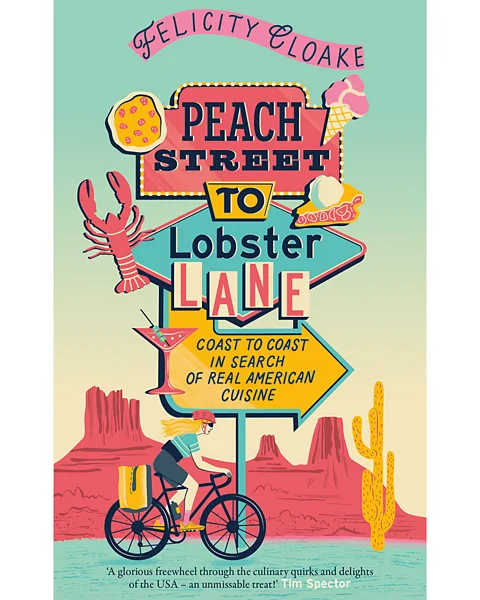 Harper Collins
Harper CollinsWhy did you decide to write a book about American food?
I don't think my publisher will mind me saying that they were a bit reluctant, because the theme is a bit tricky. If you don't already love America and its cuisine, it's difficult to see beyond the top-line stereotypes of McDonalds, KFC, ridiculous eating competitions and too much on the plate. It doesn't sound very attractive.
World's Table
BBC.com's World's Table "smashes the kitchen ceiling" by changing the way the world thinks about food, through the past, present and future.
But I was thinking about the amazing Mexican food and all the different immigrant cuisines there. There's much more of a sense of possibility, fun and flexibility when it comes to cooking in America. They don't feel so hide-bound to tradition for a lot of things as we do in Europe. And that was so exciting to me; uncovering this really playful attitude to food that manifests in potentially fun but unhealthy things like, you know, a cheeseburger that has doughnuts instead of a bun.
There is some fantastic food and fantastic produce in the US, but it just gets sort of swept under the carpet because we only see this cartoonish version. For me, there's always been a glamour about America, which I find hard to shake. It's a sense of "wow, everything's like it is in the movies". And it is!
You spent 10 weeks cycling across the US in search of the best food. Why did you decide to travel by bike?
I thought: I've cycled in Italy, I've cycled in France. How different can it be? And then when I got closer to the trip, I was more concerned. Everyone I knew tried to put me off. But I actually found that it was a great place to cycle. I did end up riding down a six-lane freeway in LA, but there are lots of little roads too. It's a bit like France in that way; because the country is so vast, the smaller roads tend to be quite quiet. It gave me access to a side of America that I hadn’t seen before because I'd always been in a car, passing through at speed.
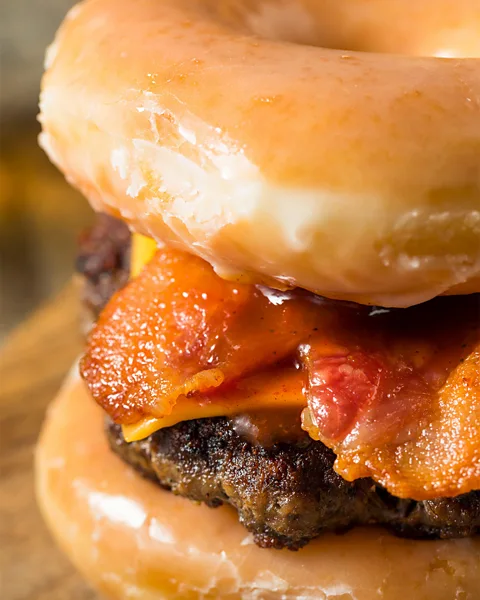 Alamy
AlamyDid you discover a culinary style that is distinctly American?
Yes! I think it centres around the idea of playfulness and a lack of concern for tradition and the "right" way of doing things. That's what annoys so many people from the more established and conservative food cultures about American food; that's why they are so dismissive. It's a fun place to eat and they've got some great produce. They don't overcomplicate it either.
I had some brilliant farm-to-table food in New England in particular. When American food is good, it's up there with the world's best. People need to look beyond the American businesses that are on their local high streets to find real American cuisine. It's a very fun place to eat.
What was your favourite meal?
I find mashups of unexpected food cultures really exciting. My best meal was at a restaurant in San Antonio where a Taiwanese American chef was making the Tex-Mex food she had grown up with, under Taiwanese influences. So it was things like an orange chicken fried steak and mochi hush puppies. I found that exciting because it's not something that you would ever find somewhere else. Tex-Mex is seen as a mash up in itself, and to add a third culture to the mix just feels mind blowing. There was so much creativity and fun, but it was also delicious. It was clever cooking but it was light-hearted as well, and I love that.
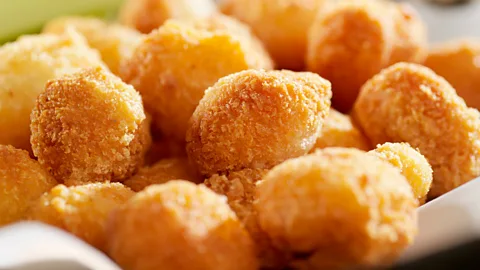 Getty Images
Getty ImagesWhat surprised you most about the trip?
America is expensive! Ten years ago, travelling in America was very cheap. Food was cheap, motels were cheap. But that is no longer the case – and it was a bit of a shock to the system. I bought a grapefruit in Ohio that cost $2.99 – it would have cost 60p in the UK, and it had surely been grown in Florida. So that was extraordinary. Then the whole tipping culture thing… it's just a really expensive place to be.
What struck you most about the differences between English and American food culture?
It was difficult getting food that wasn't processed in some way. It's not that people aren't health conscious, it's more that the stuff being marketed as health food is at odds with what I would regard as healthy food. It's very processed, it's packaged. I found it hard to find an unprocessed fruit or vegetable.
Then the throwaway nature of everything really bothered me. It's hard to recycle there. And I don't get the same enjoyment from eating from a plastic plate. There are a few issues surrounding food that made me proud of how much British food has changed.
What was your biggest learning from the trip?
I hadn't appreciated that all stereotypes of American food in my mind – the hotdogs, burgers and ice cream sundaes – were all imports as well. I had thought about Mexican food and Korean food, and then the rest was American food. But I realised that no; all the food bar Native American food heritage – which is being reclaimed these days – all of it is an import. I would love to go to the Lakes region and learn more about that food culture. There's popcorn, jerky and wild rice, although that's more of an ingredient than a dish.
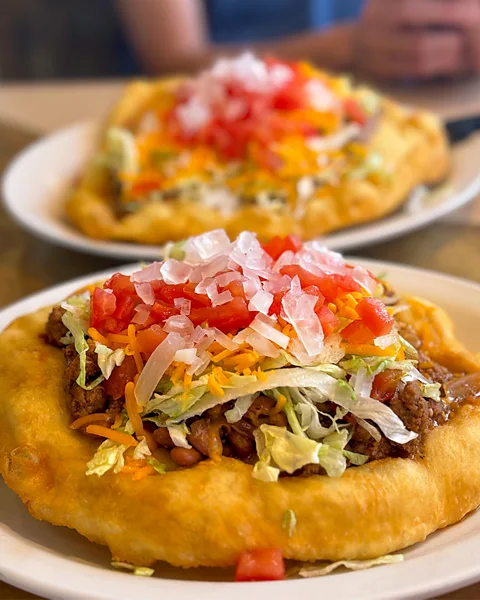 Getty Images
Getty ImagesOverall, it's a much more exciting cuisine than I imagined it would be. As different waves of people come in and mix, there's more to see and try. It's evolving and changing – it feels like boundless possibility.
Is there anything you'd do differently if you had the chance to do it again?
I do slightly regret that I didn't eat any really trashy fast food that we don't get here yet. There is a lot more that I could have found. Another odd regret is that I didn't eat more. I was obsessed with the idea that I was going to die if I didn't eat enough vegetables. I ate a lot of salads out of the bag. I think I might have been a bit overanxious with that, looking back. And if it wasn't for my dog, I would have gone for longer. I would have liked to have spent more time in Texas, for sure. There's so much more to explore.
Peach Street to Lobster Lane: Coast to Coast in Search of American Cuisine by Felicity Cloake, is published by Mudlark and is released on 5 June 2025.
--
If you liked this story, sign up for The Essential List newsletter – a handpicked selection of features, videos and can't-miss news, delivered to your inbox twice a week.
